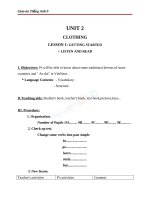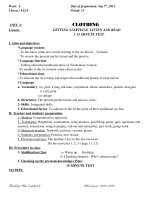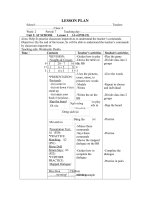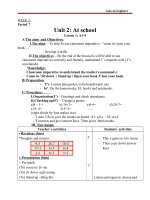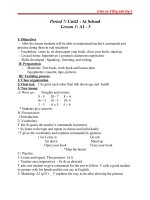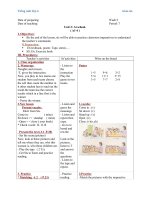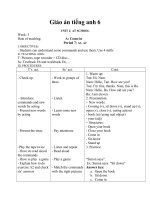Giáo án Tiếng Anh 9 Unit 2: Clothing
Bạn đang xem bản rút gọn của tài liệu. Xem và tải ngay bản đầy đủ của tài liệu tại đây (385.67 KB, 18 trang )
Tiếng Anh 9 – Giáo án
UNIT:2
CLOTHING
Period 7: GETTING STARTED & LISTEN AND READ
I/ Objectives (Mục tiêu bài học ) :
By the end of the lesson, students will be able to some more about ao dai , the traditional
dress of Vietmese women
II/ Language content ( Trọng tâm ):
Vocabulary: traditional dress, long silk tunic, material, fashionable,…
Grammar: the present perfect.
III/ Method ( Phương pháp ):Communicative approach.
IV/ Teaching aids ( Phương tiện trợ giảng ):
-
Students’ & teacher’s books.
-
Pictures
-
Real objects: ao dai,…
V/ Procedures ( Tiến trình bài học ):
Teacher’s & students’ activities
1/ Warm up:
content
T: ask ss to recall the structure (the simple past
S + WISH +S + PAST SIMPLE
with “wish”)
Ex: I wish I were taller.
2/ Presentation:
T: introduce the new lesson
1/ Getting started:
Ask ss look at the pictures and decide where
Decide where each person comes from.
each person comes from
She comes from japan, she is wearing a
Kimono.
She comes from vietnam. She is wearing
an ao dai.
….
What do you know about Aodai?
What material is Aodai made from?
Having some ss read the answer
Who wears Aodai?
T: corect
T: ask some questions.ss answer
2/ Listen and read:
New words:
Have ss listen the text
Poet (n)
Ss listen the text and then repeat after the T
Traditional designs(n)
T: explain some new words
Fashionable (adj)
Ss : read the new words(choral and individual)
Musician(n)
Poem (n)
Long silk tunic (n)
Writer (n)
Loose pants (n)
Novel (n)
ethnic minorities(n)
.3/ Practice:
(a) Complete the sentences.
Ss read in silence the text
1. ….. poems, novels, and songs.
T: ask ss answer and explain
2. …long silk tunic with slits up the
T: corect
sides worn over loose pants.
3. … to wear modern clothing at work.
4. ….line of poetry on it.
Ss read the text again and answer the questions
5. .. symbols such as suns, stars, crosses
Ss pratise in pair.
and stripes.
T: correct
(b) Anwer the question:
1/ Traditionally, men and women used to
wear the aodai.
2/ because it is more convenient.
3/ they have printed lines of peotry on it or
have added symbol such as suns, stars,
crosses, striped to the aodai.
4/ Production:
Kimono (Japan)
Ss remind the names of the clothings
……
5/ Homework:
-
Do exercises
-
Learn by heart the new words and read
the text once more
-
Preare the next lesson.” Speak “
-----o0o-----
UNIT:2
Period 8:
CLOTHING
SPEAK
I/ Objectives ( Mục tiêu bài học ) :
By the end of the lesson, students will be able to ask and answer about the hobies , the
habits about the clothing, which they wear everyday.
II/ Language content (Trọng tâm ) :
Vocabulary: colorful T- shirt, plaid skirt, plain suit, blue shorts,….
-Grammar : The present perfect tense, the passive (review).
III/ Method ( Phương pháp ) : Communicative approach.
IV/ Teaching aids ( Phương tiện trợ giảng) :
- Students’ & teacher’s books.
- Pictures
V/ Procedures ( Tiến trình bài học ):
Teacher’s & students’ activities
1/ Warm up:
content
1/ What do you usually wear on the
Ss answer some questions
weeken ?
2/ ………………… on school?.
2/ Pre- speaking:
Today, we will learn about the casual clothes
T: introduce the new lesson
that we wear daily
T: Ask ss look at the pictures and match the
(a) Match the phrases to the pictures.
phrases to the pictures.
a. A colorfull T- shirt.
b. A sleeveless sweater.
Explain the new words
Ss match the phrases to the pictures and read
the answer in front of class
T: correct and have ss read the new words
c. A striped shirt.
d. A plain suit.
e. Faded jeans
f. A short- sleeved blouse
g. Baggy pants
h. A plaid skirt
i. Blue shorts
(b)What type of clothing do you wear on Tet
holiday?
What do you wear when you go to a party?
3/ While-speaking:
What would you wear to a party?
- Ss :work in groups , read and write 2 more
…….
questions for the last section of the survey
about students’ wear:
©
T: ask ss do the excrises in part c
Group 1::
Ss work in groups
Four people said that they like their uniform.
Group 2:
Ss : interview their friends and then fill in the
Two people said that they usually wore
survey
colorfull T- shirt on the weekends.
(groupwork)
Hương said that she liked to wear faded jeans
- T : Asking S to report the result of the
on the weekends.
survey
Ex: group 1:
4/ Post:
Colorfull T-shirt
Ask ss recall the names of the clothings
Sleeveless sweater
Faded jeans
Plaid skirt,
5/ Homework:
….
- S make a list of types of clothing that most S
in the class like wearing on special cases
Learn by heart the new words
Prepare the next lesson “listen”
.
UNIT:2
Period 9:
CLOTHING
LISTEN
I/ Objectives ( Mục tiêu bài học) :
By the end of the lesson, S will be able to listen for a specific information, and describe
what people are wearing
II/ Language content ( Trọng tâm ) :
Vocabulary: public, announcement, floral pants, polka dot skirt, sandal, missing, entrance,
car fair, doll,…
Grammar: Review.
III/ Method ( Phương pháp ):
IV/ Teaching aids (Phương tiện trợ giảng) :
- Students’ & teacher’s books.
- Pictures
- Cassette, tape
V/ Procedures (Tiến trình bài học ) :
Teacher’s & students’ activities
1/ Warm up:
content
Ask ss play the game ”networks” about the
clothings
2/ Pre- listening:
You will hear a public announcememt about a
lost little girl called Mary. First, you name the
clothes in the picture,…
A} a/ A: floral pants.
B: blue shorts
C: polka dot skirt.
B}
A: long-sleeved white blouse.
B: short- sleeved pink shirt.
C: short- sleeved white shirt.
C} A: sandals
B: boots.
C: shoes with flowers.
Ss look at the pictures {a,b,c}
T: Introducing the context and ask ss” what’s
the name of the clothing in pictures”
Ss answer
T explains the name of the clothing in the
pictures
Ss listen
3/ While:
Now you will hear an anouncement and try to
answer quickly
T :ask ss to listen & answer:
Answers
a/ B: she’s wearing blue shorts
b/ A: she’s wearing a long sleeved blouse.
c/ C :she’s wearing brown shoes
Ss :Listen & choose the correct picture
showing what Mary is wearing
4/ Post:
T sticks 5 pictures of people on the board.
Ex: This person is wearing jeans
Asking 2 Ss to take turn to describe 2 persons
………..
and asking the class to guess who they are
5/ Homework:
- S write a short paragraph to describe
.
themselves
Prepare the new lesson “read”.
-----o0o-----
UNIT:2
CLOTHING
Period 10:
READ
I/ Objectives ( Mục tiêu bài học ) :
By the end of the lesson, S will be able to understand the text for details, about jeans
II/ Language content ( Trọng tàm )
Vocabulary: made from , named after, embroidered jeans. Painted jeans, generation, label,
out of fashion, …
Grammar : Review, passive.
III/ Method ( Phương pháp ) :Communicative approach, ask –answer.
IV/ Teaching aids ( Phương tiện trợ giảng) :
- Students’ & teacher’s books.
- Pictures
V/ Procedures ( Tiến trình bài học ):
Teacher’s & students’ activities
1/ Warm up:
content
T: ask ss play the game “brainstorming” about
the jeans
2/ Pre – reading:
-Ss look at the picture and answer some
Newwords
questions
-T reads the test first Ss listen and repeat .
1.
2.
-Ss find out the newwords and explain the
3.
meaning of them.
4.
- T reads the newwords first Ss repeat
5.
6.
Sailor
Designer
Embroidered
Label
Out of fashion
Generation
……………
(a) fill in the missing dates and words*
3/ While:
Answers
T: ask ss read the text and complete the 1
18century……..jeanscloth…
sentenses
2
1960s………students…….
T cues and asks Ss answer
3
1970………..cheaper……
T correts.
4
1980s……….fashion……..
5
1990s…………sale……….
Ss read the text quickly and answer the
questions
Ss ask and answer pairwork
T: correct
( b) Answer:
1/ the word “ jeans” comes from a kind of
Some ss
read the text again to check the material that was made in Europe.
pronunciation
2/ the 1960s fashions were embroidered
4/ Post:
jeans, painted jeans, and so on.
T : ask Ss to read silently again and answer
3/ because jeans became cheaper.
True /false( groupwork)
4/ Jeans at last became high fashion clothing
Having some ss read the answer
in the 1980s
T: correct
.Execrise: True or False:
5/ Homework:
1/ the word “Jeans” comes from a kind of
Learn by heart the new word and read the once material that was made in Asia.
more.
2/ Many students wore Jeans in the 1960s
Prepare the next lesson “write”.
…
----o0o-----
UNIT 2
Period 11:
CLOTHING
WRITE
I/ Objectives ( Mục tiêu bài học ) :
Students will be able to write an explosition, presenting one side of an argument
II/ Language content (Trọng tâm ) :
Vocabulary: be equal in, be prond of, bear, self- confident, encourage, ..
Grammar : in my opinion, I think, firstly, secondly, finally
III/ Method ( Phương pháp ) :
IV/ Teaching aids ( Phương tiện trợ giảng ):
Book, textbook
V/ Procedures ( Tiến trình bài học ) :
Teacher’s & students’ activities
1/ Warm up:
Ss read the text again ( read/ page17)
And answer the questions about the content
of the text
2/ Pre – writing:
T: ask ss read the execrises/( page 18)
T: introduce an argument should have:
T: ask ss read the outline :
Based on the outline A page 18
S : read the passage after studying the topic and
content
1/ Where does the word jeans comes from?
2/ what were the 1960’s fashion?
the outline A
Encourage
Equal
bear
practical
T: explain some new words
I think, secondary school students should
wear casual clothes.
3/ While-Writing:
Firstly, casual clothes make students feel
comfortable.
S : read the topic and outline B, then write a Secondly, wearing casual clothes gives
paragraph of 100- 150 words. Then compare students feedom of choice, they have right to
their writing with partner’s
choose sizes, colors, and fashion that they
T : take some writings and correct them in love.
class
Thirdly, casual clothes make students feel
confident when they are in their favorite
clothes.
Finally, casual clothes make school more
4/ Post:
colorful and lively.
One Ss write the paragraph on the board
In conclusion, secondary school students
T remarks and correts
should wear casual clothes .
Wearing
casual
clothes
comfortable, and fun.
5/ Homework:
S : write the exposition (has been corrected
is
convenient,
yet ) in the notebooks
Prepare the next lesson “ Language focus”
-----o0o-----
UNIT:2
Period 12:
CLOTHING (cont)
LANGUAGE FOCUS
I/ Objectives ( Mục tiêu bài học):
Students will be able to use the present perfect tense and the passive form of present
perfect, simple present, simple past, simple future tense
II/ Language content (Trọng tâm)
Vocabulary: Review
Grammar:: : the present perfect, passive.
III/ Method ( Phương pháp ) : ask and answer.
IV/ Teaching aids (Phương tiện trợ giảng):
Book, textbook, pattern drills
V/ Procedures(Tiến trình bài học)::
Teacher’s & students’ activities
1/ Warm up:
Content
*Chating
- Have you ever gone abroad ?
T : ask some questions
- Have you ever eaten durian ?
S : answer
- How long have you learnt English ?
T : ask Ss to pay attention to “ Have you - When did you start learning English ?
ever…..” and explain the differences and the
similarities between “How long“ and“When “
{1} The persent perfect with since and for_
S : draw the rules of the present perfect tense
( revision )
2/ Practice:
Activitive 1:
S +HAVE/ HAS + PP
A. Lien, come here and see my photo
album.
T : ask Ss to look at the dialogue
B. Oh, so beautiful! Who’s this boy?
S :practice the dialogue and recognize the
A. It’s Quang, my brother’s friend.
sentences in present perfect tense. Then give
B. How long have you known him?
out the rules of it and examples
......
T : pay attention to the words go with this For+ duration of time( for three days)
tense, especially, “for” and” since” and give Since + point in time ( since March 20)
examples
Activitive 2:
{2} present perfect with already, yet.
T : pay attention to the words go with this * yet: cuối câu phủ định và nghi vấn.
tense, especially, “yet” and” already” and * already:giữa trợ động từ và động từ chính
give examples
- She hasn’t read this book yet
Activitive 3:
- Have you ever seen this play ?
T: explain the structures:
T: ask ss to practise exercises in pairs
{3} The present perfect with ever.
Vài cặp hs hỏi trả lời trước lớp.
Gv đưa ra đáp án gợi yù
HAVE /HAS + S+ EVER+PP ?
A: have you ever seen a comic?
B: yes,I have.
A: when did you last read one?
Activitive 4:
B: this morning.
S :use the structures of passive forms to do ……..
the exercises, then give out
T : correct
{4} Passive form :
1. Simple present tense :
S + is / am / are + Vp.p + by + O
2. Simple past tense :
S + was / were + Vp.p + by O
3. Simple future tense and Modal verbs
S + modal V + be + Vp.p + by + O
4. Present perfect tense :
S + have / has + been + Vp.p + by + O
5. Near future :
S+is/am/are+going to be +Vp.p +by + O
* Exercise 4 page 21
(A) Jeans cloth was made completely from
cotton on the 18th century.
* Exercise 5 page 21 :
(B) Rice is grown in tropical countries
(C) Five million bottles of chapagne will
T: explain the requirement the exercise in
be produced in France next year.
part 5
Some ss read the answer
{5} The passive form with modal verbs
MODAL VERBS + BE+ PP
HAVE TO/ BE GOING TO +BE+PP
Ex: this exercise can be done easily.
a. The problem can be solved
b. Experiments on animals should be stopped
c. Life might be found on another planet
d. All the schools in the city have to be
improved
e. A new bridge is going to be built in the
area.
3/ Production:
T: ask Ss about the grammar points they have
*Turn into passive.
received
1/ My teacher asked me to be here at 10 am.
T: write the exercises and some ss read the 2/ My aunt made the sweater for her son
answer (if have time )
3/ They made this shirt from Hong Kong.
4/ They built this house last month.
5/ They built the church in 18 th century.
…..
5/ Homework:
T : ask Ss to do the exercises again and write
down in their notebooks
Prepare the next period : test 45’
-----o0o-----
Period:13
REVISION
I/ Objectives (Mục tiêu ) :
Students will review all the structures and the words that they have learn in Unit 1 and 2.
II/ Contents ( Nội dung ):
-
Structures: Passive forms, The past simple with “WISH “.
III/ Procedures ( Tiến trình bài học ) :
-
Give somes excreises students do them.
1. Rewrite the sentences .
a. They don’t have many friends
They wish ________________________
b. He is very short
He wishes ________________________
c. She can’t do this homework.
She wishes _______________________
d. They will visit their friends tomorrow.
Their friends ___________________________
e. They grow rice in tropical country.
Rice __________________________________
…………
2. Rewrite the letter and the paragraph in unit 1 and 2.
3. ………………………….
